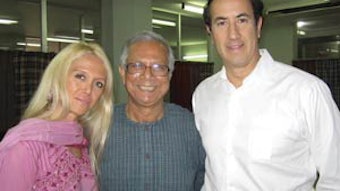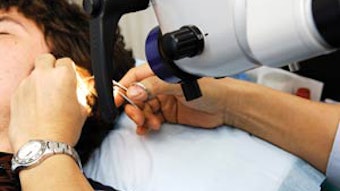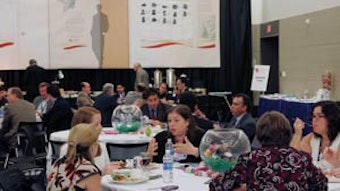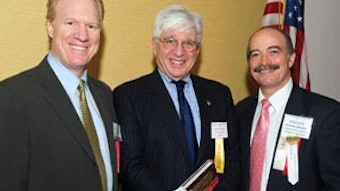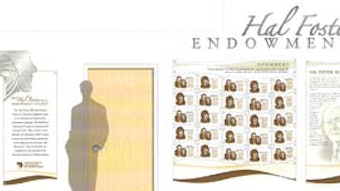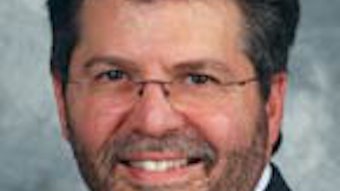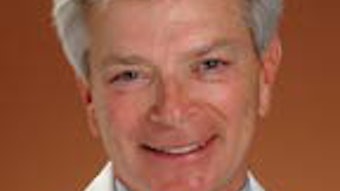Heed the Call of World Voice Day April 16, 2011
M. Steele Brown, special to the Bulletin Although the voice is humanity’s chief means of one-to-one communication, issues surrounding vocal health make very little noise on the national healthcare scene. On one hand, you cannot turn around without seeing a pink ribbon or a yellow wristband reminding you about breast health and testicular cancer. On the other hand, there’s astonishingly little clamor for people to take care of their vocal cords. “People do very little to take care of their voices,” said Michael M. Johns III, MD, associate professor in the department of Otolaryngology—Head and Neck Surgery at Emory University School of Medicine and the director of the Emory Voice Center in Atlanta. “Everywhere you go, people are screaming over the crowd at the bar, talking way too loudly into their mobile phone in a crowded area or while they’re driving down the road, or yelling at their kids. That list goes on and on. “What that means is that people are not recognizing that there are limits to what their voices can do and that there is damage they can do to their vocal cords if they don’t take care,” he said. “And those behaviors overlap in a sort of ‘Venn diagram’ way with many voice disorders.” For this reason the American Academy of Otolaryngology—Head and Neck Surgery (AAO-HNS) urges otolaryngologist—head and neck surgeons and other voice health professionals around the world to join together to sound the call and spread the word about World Voice Day, which takes place every year on April 16. World Voice Day encourages men and women, young and old, to assess their vocal health and take action to improve or maintain good voice habits. The Academy has sponsored the observance of World Voice Day in the U.S. since its inception in 2002. “I think that World Voice Day has two main missions,” Dr. Johns said. “The first is awareness of vocal health and vocal disorders, because this is something that so many people take for granted. The second is the celebration aspect.” Dr. Johns, who is also a member of the Academy’s Voice and Laryngology committees, said most people don’t respect the vocal cords as an instrument that must be tuned and taken care of like a piano or a guitar. “After you get out of the segment of the population that uses their voice professionally — singers, professional speakers, and the like — I’d tell you that most people probably respect the guitarist’s ability more than that of the lead singer,” he said. “You take someone like Jennifer Nettles (lead singer of headlining country music act Sugarland). People think she can just sing like that because she was born with it, while the guy playing the guitar had to practice to develop his abilities. “But what people don’t realize,” Dr. Johns continued, “is that you have to work to sing like she does. No matter who you are, if you’re interested in singing, dynamic speaking, or whatever, you can train yourself to get to those higher levels of performance. That is an important message that people need to hear.” Dr. Johns said it is even more important for otolaryngologist—head and neck surgeons and other voice health professionals to make the public aware of the hidden dangers that exist from over-working one’s voice. “Just like an early-stage cancer, you’re typically not going to feel pain when you’re developing a vocal disorder,” he said. “When you’re running and you strain something and you feel a sharp pain, that’s your first warning sign that there’s a problem, but the same isn’t true in the larynx. Pain in the larynx is pain of a different type, so people continue to use their voice when they crop up with, for example, viral laryngitis. They just figure, ‘I’ll power through it,’ and they end up scarring their vocal cords.” Dr. Johns said it is imperative that otolaryngologist—head and neck surgeons and other voice health professionals let their patients know that hoarseness lasting longer than two weeks needs to be examined. “They need to have their throats looked at by an otolaryngologist to check for cancerous nodes,” he said. “Unfortunately, too many of our patients are unaware that it could be serious, saying to themselves, ‘If I just wait long enough, it will get better.’ Then, of course, cancers grow larger and the rate of survival drops to nothing.” World Voice Day began in Brazil in 1999, when a group of voice care professionals decided to celebrate the voice by establishing Brazilian Voice Day. The theme for World Voice Day 2011—”We share a voice”—calls attention to the important role otolaryngologists play in stemming the tide of vocal disorders. Robert T. Sataloff, MD, DMA, the editor-in-chief of the journal Ear, Nose & Throat, has written extensively on this issue, saying that too many communities in the United States and elsewhere still do not actively celebrate World Voice Day. “This event provides an opportunity for all of us to collaborate with colleagues in speech-language pathology, singing, acting, public speaking, education, the media, and other endeavors,” he said. “Vocal health is critical to our communication-oriented society, but the voice does not receive the public recognition and appreciation it deserves. World Voice Day provides us a perfect forum through which to refamiliarize ourselves with the latest advances in laryngology and voice care, and to educate our colleagues, patients, and communities via lectures, free voice screenings, community outreach programs, and other offerings.” Dr. Sataloff is chair of the department of Otolaryngology—Head and Neck Surgery and the senior associate dean for Clinical Academic Specialties at Drexel University College of Medicine in Philadelphia. He pointed out that the past few decades have seen remarkable advances in voice diagnosis and treatment that have raised the standard of care for all voice patients. Also a professional singer and teacher who holds an undergraduate degree in music theory and composition, and a doctorate in voice performance, Dr. Sataloff said that World Voice Day provides a perfect platform on which to highlight these advances and to educate the media about the state-of-the-art in voice care. Dr. Johns echoed this sentiment and encouraged otolaryngologists to reach out to other groups in spreading the word. “The fun part about World Voice Day is that it provides an opportunity to recognize multiple specialties, such as otolaryngology—head and neck surgery, speech pathology, singing teachers, voice coaches, all of whom have a kind of vested interest in the voice,” he said. “It is so important for us to take advantage of these folks and foster collaboration between the different voice care specialties. “World Voice Day provides an opportunity for otolaryngologists to get involved in their communities and share information that’s not always obvious to people around them. It is also a good opportunity to drive patients to your practice.” Dr. Johns said the Emory Voice Center usually puts on an event for the Atlanta community to raise awareness on a local level. “Last year, we put on a conference on disability in the voice,” he said. “There really is very little literature about this issue out there. “People with voice problems are disabled, but classifications are based on whether or not you can use your limbs or the quality of your eyesight, not whether or not you can use your voice. We had international speakers come to raise awareness about the issue and we had a pretty good turnout — maybe 150 people from a host of different segments of the population.” Dr. Johns said that Emory is reaching out to the singing voice community in 2011. “We are going to offer free vocal cord screenings for anyone who wants them,” he said. “That’s nothing novel or earth-shattering, but we haven’t done that yet, so it seemed like a good idea.” Dr. Johns said he believes it always makes sense to get a baseline exam and tells the physicians at Emory to encourage their patients to do so. “If you’re a singer or broadcast journalist or someone who uses his or her voice professionally, it is important to get a baseline exam of your instrument. The key is the video record, because once you’ve had a baseline video stroboscopy, you’ve got a baseline in case you get sick.”

Although the voice is humanity’s chief means of one-to-one communication, issues surrounding vocal health make very little noise on the national healthcare scene.
On one hand, you cannot turn around without seeing a pink ribbon or a yellow wristband reminding you about breast health and testicular cancer. On the other hand, there’s astonishingly little clamor for people to take care of their vocal cords.
“People do very little to take care of their voices,” said Michael M. Johns III, MD, associate professor in the department of Otolaryngology—Head and Neck Surgery at Emory University School of Medicine and the director of the Emory Voice Center in Atlanta. “Everywhere you go, people are screaming over the crowd at the bar, talking way too loudly into their mobile phone in a crowded area or while they’re driving down the road, or yelling at their kids. That list goes on and on.
“What that means is that people are not recognizing that there are limits to what their voices can do and that there is damage they can do to their vocal cords if they don’t take care,” he said. “And those behaviors overlap in a sort of ‘Venn diagram’ way with many voice disorders.”
For this reason the American Academy of Otolaryngology—Head and Neck Surgery (AAO-HNS) urges otolaryngologist—head and neck surgeons and other voice health professionals around the world to join together to sound the call and spread the word about World Voice Day, which takes place every year on April 16. World Voice Day encourages men and women, young and old, to assess their vocal health and take action to improve or maintain good voice habits. The Academy has sponsored the observance of World Voice Day in the U.S. since its inception in 2002.

Dr. Johns, who is also a member of the Academy’s Voice and Laryngology committees, said most people don’t respect the vocal cords as an instrument that must be tuned and taken care of like a piano or a guitar.
“After you get out of the segment of the population that uses their voice professionally — singers, professional speakers, and the like — I’d tell you that most people probably respect the guitarist’s ability more than that of the lead singer,” he said. “You take someone like Jennifer Nettles (lead singer of headlining country music act Sugarland). People think she can just sing like that because she was born with it, while the guy playing the guitar had to practice to develop his abilities.
“But what people don’t realize,” Dr. Johns continued, “is that you have to work to sing like she does. No matter who you are, if you’re interested in singing, dynamic speaking, or whatever, you can train yourself to get to those higher levels of performance. That is an important message that people need to hear.”
Dr. Johns said it is even more important for otolaryngologist—head and neck surgeons and other voice health professionals to make the public aware of the hidden dangers that exist from over-working one’s voice.
“Just like an early-stage cancer, you’re typically not going to feel pain when you’re developing a vocal disorder,” he said. “When you’re running and you strain something and you feel a sharp pain, that’s your first warning sign that there’s a problem, but the same isn’t true in the larynx. Pain in the larynx is pain of a different type, so people continue to use their voice when they crop up with, for example, viral laryngitis. They just figure, ‘I’ll power through it,’ and they end up scarring their vocal cords.”
Dr. Johns said it is imperative that otolaryngologist—head and neck surgeons and other voice health professionals let their patients know that hoarseness lasting longer than two weeks needs to be examined.
“They need to have their throats looked at by an otolaryngologist to check for cancerous nodes,” he said. “Unfortunately, too many of our patients are unaware that it could be serious, saying to themselves, ‘If I just wait long enough, it will get better.’ Then, of course, cancers grow larger and the rate of survival drops to nothing.”
World Voice Day began in Brazil in 1999, when a group of voice care professionals decided to celebrate the voice by establishing Brazilian Voice Day. The theme for World Voice Day 2011—”We share a voice”—calls attention to the important role otolaryngologists play in stemming the tide of vocal disorders.
Robert T. Sataloff, MD, DMA, the editor-in-chief of the journal Ear, Nose & Throat, has written extensively on this issue, saying that too many communities in the United States and elsewhere still do not actively celebrate World Voice Day.
“This event provides an opportunity for all of us to collaborate with colleagues in speech-language pathology, singing, acting, public speaking, education, the media, and other endeavors,” he said. “Vocal health is critical to our communication-oriented society, but the voice does not receive the public recognition and appreciation it deserves. World Voice Day provides us a perfect forum through which to refamiliarize ourselves with the latest advances in laryngology and voice care, and to educate our colleagues, patients, and communities via lectures, free voice screenings, community outreach programs, and other offerings.”
Dr. Sataloff is chair of the department of Otolaryngology—Head and Neck Surgery and the senior associate dean for Clinical Academic Specialties at Drexel University College of Medicine in Philadelphia. He pointed out that the past few decades have seen remarkable advances in voice diagnosis and treatment that have raised the standard of care for all voice patients. Also a professional singer and teacher who holds an undergraduate degree in music theory and composition, and a doctorate in voice performance, Dr. Sataloff said that World Voice Day provides a perfect platform on which to highlight these advances and to educate the media about the state-of-the-art in voice care.
Dr. Johns echoed this sentiment and encouraged otolaryngologists to reach out to other groups in spreading the word.
“The fun part about World Voice Day is that it provides an opportunity to recognize multiple specialties, such as otolaryngology—head and neck surgery, speech pathology, singing teachers, voice coaches, all of whom have a kind of vested interest in the voice,” he said. “It is so important for us to take advantage of these folks and foster collaboration between the different voice care specialties.
“World Voice Day provides an opportunity for otolaryngologists to get involved in their communities and share information that’s not always obvious to people around them. It is also a good opportunity to drive patients to your practice.”
Dr. Johns said the Emory Voice Center usually puts on an event for the Atlanta community to raise awareness on a local level.
“Last year, we put on a conference on disability in the voice,” he said. “There really is very little literature about this issue out there.
“People with voice problems are disabled, but classifications are based on whether or not you can use your limbs or the quality of your eyesight, not whether or not you can use your voice. We had international speakers come to raise awareness about the issue and we had a pretty good turnout — maybe 150 people from a host of different segments of the population.”
Dr. Johns said that Emory is reaching out to the singing voice community in 2011. “We are going to offer free vocal cord screenings for anyone who wants them,” he said. “That’s nothing novel or earth-shattering, but we haven’t done that yet, so it seemed like a good idea.”
Dr. Johns said he believes it always makes sense to get a baseline exam and tells the physicians at Emory to encourage their patients to do so.
“If you’re a singer or broadcast journalist or someone who uses his or her voice professionally, it is important to get a baseline exam of your instrument. The key is the video record, because once you’ve had a baseline video stroboscopy, you’ve got a baseline in case you get sick.”
